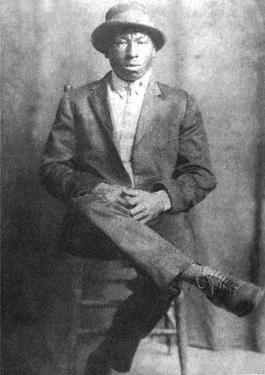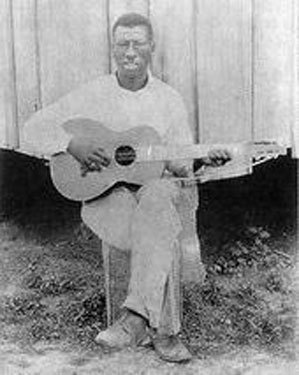<Back to Index>
- Bluesman Freddie Spruell, 1893
- Bluesman Tommy Johnson, 1896
- Bluesman Ishman Bracey, 1901
PAGE SPONSOR
He was variously billed as Papa Freddie or Mr. Freddie, and he is generally regarded as the first Delta bluesman to be recorded ("Milk Cow Blues", 1926). However, both Mamie Smith (1920) and Blind Lemon Jefferson (1925), pre-dated him in waxing the first 'blues' records. Details of his life are sketchy and sometimes contradictory.
Spruell was probably born in Lake Providence, Louisiana, United States, but relocated with his family to Chicago, Illinois, as a small child. His Social Security records gave his birth date as December 1893. His recordings, although classed as Delta blues, were noted for reasons of his musical styling, rather than any geographical accuracy regarding his long - time place of residence.
On June 25, 1926, Spruell cut "Milk Cow Blues" in Chicago. The track was released by Okeh Records, alongside "Muddy Water Blues" which was recorded in November that year, both sides using the Papa Freddie name. His second single release included "Way Back Down Home" and the same "Muddy Water Blues" track. He recorded two more songs in 1928, one of which was "Tom Cat Blues", and were issued by Paramount Records as by Mr. Freddie Spruell. Five further songs were recorded in April 1935, and released under the shorter Mr. Freddie name on the Bluebird Records label. This latter recording session saw him cut "Let's Go Riding", his best known number. Carl Martin played second guitar behind Spruell, on the track.
At the insistence of his own mother, Spruell's playing of secular music ended in the mid 1940s, and he became a Baptist preacher.
Spruell died in Chicago in June 1956, after a lengthy stay in hospital. He was aged 62. However, no death certificate has yet been uncovered.
All his recorded work was included in the compilation album, Mississippi Blues: Complete Recorded Works, Vol. 2 (1926 - 1935).
"Let's Go Riding" was featured in the soundtrack of the 2001 film, Ghost World.

Tommy Johnson (1896 – November 1, 1956) was an influential American delta blues musician, who recorded in the late 1920s, and was known for his eerie falsetto voice and intricate guitar playing.
Johnson was born near Terry, Mississippi, and moved around 1910 to Crystal Springs where he lived for most of his life.
He learned to play the guitar and, by 1914, was supplementing his
income by playing at local parties with his brothers Major and LeDell.
In 1916 he married and moved to Webb Jennings' Plantation near Drew,
Mississippi, close to the Dockery Plantation. There he met other
musicians including Charlie Patton and Willie Brown.
By 1920 he had become an alcoholic and itinerant musician, based in Crystal Springs but traveling widely around the South, sometimes accompanied by Papa Charlie McCoy. In 1928 he made his first recordings with McCoy for Victor Records. The recordings included "Canned Heat Blues", in which he sang of drinking methanol from the cooking fuel Sterno. The song features the refrain "canned heat, mama, sure, Lord, killing me." The blues group Canned Heat took their name from this song. Johnson's "Big Road Blues" inspired Canned Heat's song, "On the Road Again". A significantly different version of the song appears as "Canned Heat" on the Big Road Blues album by K.C. Douglas.
He recorded two further sessions, in August 1928, and for Paramount Records in December 1929. He did not record again, mistakenly believing that he had signed away his right to record. This resulted in a legal settlement with The Mississippi Sheiks who had used Johnson's "Big Road Blues" melody in their successful "Stop and Listen". Johnson was party to the copyright settlement, but was too drunk at the time to understand what he had signed to.
Johnson's recordings established him as the premier Delta blues vocalist of his day, with a powerful voice that could go from a growl to a falsetto. He was also an accomplished guitarist. His style influenced later blues singers such as Robert Nighthawk and Howlin' Wolf, whose song "I Asked for Water (She Brought Me Gasoline)" was based on Johnson's "Cool Water Blues". He was a talented composer, blending fragments of folk poetry and personalized lyrics into set guitar accompaniments to craft striking blues compositions such as "Maggie Campbell".
To enhance his fame, Johnson cultivated a sinister persona. According to his brother LeDell, he claimed to have sold his soul to the devil in exchange for his mastery of the guitar. This story was later also associated with Robert Johnson, to whom he was unrelated. Tommy Johnson also played tricks with his guitar, playing it between his legs and behind his head, and throwing it in the air while playing.
Johnson remained a popular performer in the Jackson area through the 1930s and 1940s, sometimes performing with Ishman Bracey. He was highly influential on other performers, partly because he was willing to teach his style and his repertoire. Tommy Johnson's influence on local traditions is discussed by David Evans in Tommy Johnson and ''Big Road Blues. Tradition & Creativity in the Folk Blues.
He died of a heart attack after playing at a party in 1956. He is buried in the Warm Springs Methodist Church Cemetery outside of Crystal Springs, Mississippi. In 2001 a headstone was commissioned through the Mt. Zion Memorial Fund, a Mississippi non - profit corporation, by the family of Tommy Johnson and paid for by musician Bonnie Raitt. The large, granite memorial engraved with Johnson's portrait has not been placed on Johnson's grave, however, due to a bitter, ongoing dispute between Tommy Johnson's family, led by his niece, Vera Johnson Collins, the owners of farm property encircling the cemetery, and the Copiah County Board of Supervisors. The headstone has remained on public display in the Crystal Springs, Mississippi Public Library since being unveiled on October 20, 2001. An annual Tommy Johnson Blues Festival is now held in Crystal Springs, on every third weekend in October. The inaugural edition was held in Jackson and Crystal Springs in 2006.
In the 2000 movie O Brother, Where Art Thou? there is a
character named Tommy Johnson (played by Chris Thomas King) who sold his
soul to the devil to play guitar. He plays accompaniment for the Soggy Bottom Boys
(a band consisting of the film's three main protagonists plus Johnson)
on "Man of Constant Sorrow". The character of Tommy Johnson in O Brother, Where Art Thou?
is reminiscent of the real Tommy Johnson, who used to talk about how
"he sold his soul to the devil" at a crossroads in return for making up
songs and playing the guitar. The character plays a number of songs by
blues musician Skip James.


Ishman Bracey (January 9, 1901 – February 12, 1970) was an American blues singer and guitarist from Mississippi, considered one of the most important early delta blues performers. With Tommy Johnson, he was the center of a small Jackson, Mississippi, group of blues musicians in the 1920s. His name is incorrectly spelled "Ishmon" in some sources and on some records.
Bracey was born in Byram, Mississippi, and started playing at local dances and parties around 1917. He also worked as a waterboy on the Illinois Central Railroad. He first recorded in Memphis in 1928 for the Victor label, with Charlie McCoy on second guitar, recording two sessions in February and August that year.
At that time his style had not fully formed and his performances varied considerably, probably in his attempts to become more commercially successful. Bracey's blues "Saturday Blues" and "Left Alone Blues", used interesting variations in the usual three line verse form. Bracey was one of the few Mississippi bluesmen who sang with a nasal tone without embellishment. In "Saturday Blues" he used one of the conventional infidelity themes, but he changed the form of the verses to fit a newer melodic concept. His lyrics loosen up enough to sing about skin creams and powder advertised as being able to lighten dark skin.
When he recorded in 1930 his voice had darkened and he tried to use a falsetto voice in "Woman Woman Blues" with an octave leap in the second line, but the effect was clumsy and unsteady.
He recorded again in 1931 for Paramount Records with a group called the New Orleans Nehi Boys, which included guitarist Charles Taylor. Bracey's total recorded output is only 16 songs, and original copies of his 78 rpm records are among the most valued items sought by blues collectors. "Trouble Hearted Blues" and "Left Alone Blues" are his best known songs.
He was an associate of Tommy Johnson, and the pair performed together in medicine shows in the 1930s. By the time he was "rediscovered" in the late 1950s, he had become a preacher and a performer of religious songs, and was uninterested in recording or discussing his time as a blues performer. However, he did help in the rediscovery of his contemporary Skip James.